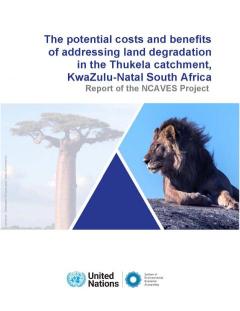
This study investigates the economic case for ecosystem management and restoration interventions in the Thukela River Basin over the period 2021-2030 to achieve or exceed land degradation neutrality relative to a 2015 baseline. It weighs the benefits of ecosystem restoration – in terms of the monetary value of improved provision of selected ecosystem services – against the costs of interventions.
The analysis demonstrates the utility of ecosystem accounts – consistent with the System of Environmental Economic Accounting – Ecosystem Accounting (SEEA EA) framework – to inform policymaking. It includes the following ecosystem services: water retention (regulation of water supply), sediment retention (erosion control), carbon sequestration, provisioning of livestock products, provisioning of wood products, provisioning of non-wood products and nature-based tourism.
It also compares estimates how these services change by 2030 under a business-as-usual scenario with low intervention levels and continued degradation, and then compares this to ecosystem service delivery under two possible intervention scenarios - a land degradation neutrality scenario and a full restoration scenario - taking the costs of the interventions into account.
